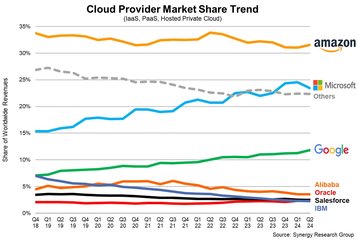Enterprise spending on cloud computing reached $79 billion in Q2 2024, according to data from Synergy Research.
This is up $14.1bn, or 22 percent from the same quarter last year.
It is also the third consecutive quarter to see year-on-year (YoY) growth of 20 percent or more.
As is to be expected, the Big Three led the pack in beneficiaries of this spend. Amazon Web Services (AWS) saw an overall market share of 32 percent, Microsoft 23 percent, and Google 12 percent for the quarter.
According to Synergy, this dominance is even more prominent in the public cloud space, with the three accounting for 73 percent of that niche.
Among the tier-two cloud providers, Oracle saw notable growth and is now tied with Salesforce as the fifth largest cloud provider.
“We are now seeing more normalized growth of the cloud market, though some speed bumps do remain. As one example, were it not for a strengthened US dollar, the Q2 growth rate would have been around one point five percentage points higher,” said John Dinsdale, a chief analyst at Synergy Research Group.
“As the market pushes ever higher, the competitive dynamics continue to evolve. Amazon and Google’s share both nudged upwards in Q2 while Microsoft’s share dropped a little, though the trend lines for both Microsoft and Google continue heading upwards. Among the next group of companies, Oracle is now starting to separate itself to become a top five player, though the gulf between it and the leaders remains huge. In this market, Google is almost five times the size of Oracle, while Amazon is almost three times the size of Google.”
Split by region, APAC saw the greatest growth in enterprise cloud spend, with 25 percent YoY. In Europe, the largest cloud markets remain in the UK and Germany, but Ireland, Italy, and Spain saw the highest growth rates.
Microsoft, Google, and AWS have all recently released their financial results for the latest quarter, seeing continued growth. Capex continues to meaningfully grow across the board, with much of it due to investment in technical infrastructure for cloud computing and artificial intelligence.




